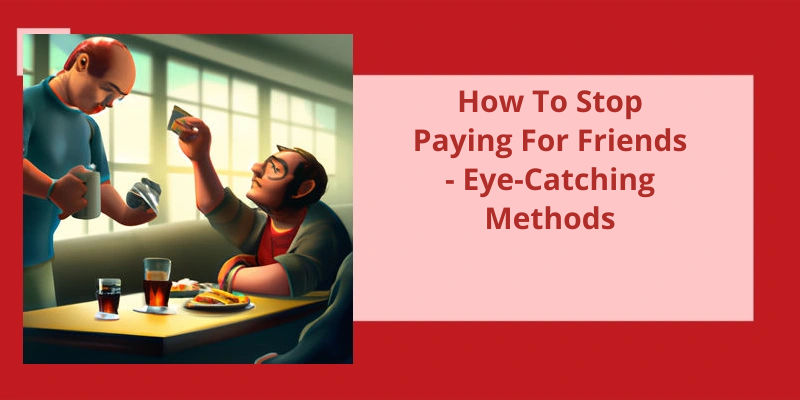Have you ever found yourself constantly footing the bill when going out with friends? Do you feel like you're always the one paying for meals, drinks, and outings? It's time to put an end to this one-sided financial arrangement and regain control of your finances. In this article, we will explore various eye-catching methods to stop paying for friends without causing strain in your relationships. From setting boundaries and being assertive to suggesting alternative, cost-effective activities, these strategies will empower you to maintain healthy friendships while ensuring that your wallet stays intact. So, if you're ready to break the cycle of being the perpetual payer, read on and discover how to stop paying for friends in a way that’s both effective and attention-grabbing.
How Do I Not Spend Money on Friends?
Balancing friendship and budget can be a challenging task, especially when it comes to spending money on friends. However, there are several strategies that can help you maintain strong friendships without constantly draining your wallet.
First and foremost, it’s crucial to be honest with your friends about your financial situation. True friends will understand and support you even if youre unable to join them for expensive outings. By openly communicating your limitations, you can foster a mutually respectful relationship that isnt solely based on splurging on lavish experiences together.
Instead of constantly going out to expensive restaurants or engaging in costly activities, suggest alternative ways to spend quality time with your friends. You could plan a picnic in the park, organize a game night at home, or explore free events happening in your community. By being creative and innovative, you can still create memorable experiences without breaking the bank.
Take the time to evaluate your income and expenses, and set limits on how much youre willing to spend on social outings. Being disciplined in following your budget won’t only help you save money but also prioritize your financial well-being.
In order to avoid feeling pressured to overspend when social opportunities arise, it’s important to save up money in advance. Set aside a portion of your earnings specifically for socializing with friends and allocate a predetermined amount for each outing. This way, youll have the funds readily available without compromising your overall financial stability.
Remember, true friendship isn’t measured by the amount of money spent but by the quality of time and emotional support shared.
Building a Support Network of Friends Who Share Similar Financial Values
Building a support network of friends who share similar financial values is an effective way to stop paying for friends. By surrounding yourself with individuals who prioritize financial responsibility and share your values, you can create a positive environment where spending habits align and peer pressure to overspend is minimized.
When it comes to spending money on friends, there are various ways to be more intentional and thoughtful without breaking the bank. Rather than relying on expensive outings or extravagant gifts, it’s possible to propose low-cost activities that foster meaningful connections. Additionally, contributing something we already have on hand can showcase thoughtfulness and resourcefulness. Another approach is to only say “yes” to activities that we genuinely enjoy or believe will strengthen friendships. Finally, thoughtful, inexpensive gifts can go a long way in expressing appreciation and affection for our friends.
How Can I Spend Money on My Friends?
In our modern world, it’s easy to fall into the trap of spending money on our friends. We often find ourselves caught up in the societal pressure to constantly treat and impress others. However, I’ve recently become more intentional about my friend spending and have discovered some eye-catching methods to stop paying for friends.
One of the first steps I took in reevaluating my friend spending was proactively proposing low-cost activities. Instead of always suggesting expensive outings or events, I began suggesting activities that were both enjoyable and budget-friendly. This not only allowed me to save money but also helped foster deeper connections with my friends as we bonded over simple and meaningful experiences.
Another approach I adopted was to contribute something we already have on hand. Instead of always reaching for my wallet, I started thinking about how I could contribute to our outings in other ways. Whether it was cooking a homemade meal or hosting a movie night at my place, finding ways to utilize what we already had helped shift the focus away from money and onto shared experiences.
Saying “yes” to activities I truly wanted to do or believed would strengthen our friendships also became a priority. I realized that I didnt have to attend every expensive outing or event just to maintain a friendship. By choosing activities that genuinely interested me or had the potential to deepen our connection, I was able to save money while still investing in meaningful experiences.
When it came to gift-giving, I began opting for thoughtful but inexpensive gifts. It isn’t always necessary to splurge on expensive presents to show appreciation. Instead, I started focusing on finding gifts that held personal significance or created lasting memories. From handwritten notes to small tokens of appreciation, these gestures went a long way in strengthening our friendships without breaking the bank.
Setting Boundaries and Being Honest About Financial Limitations: Discussing Budget Constraints With Friends Can Help Manage Expectations and Prevent Overspending.
Setting boundaries and being honest about financial limitations is an important step in managing relationships with friends and preventing overspending. By openly discussing budget constraints, you can help set realistic expectations for social activities and avoid feeling pressured to spend outside of your means.
Source: Is it okay to spend money for friends?..
Conclusion
In conclusion, building genuine and meaningful relationships should be the primary focus rather than resorting to eye-catching methods and paying for friends. Cultivating mutual interests, engaging in sincere conversations, and investing time and effort into understanding and supporting one another can result in lifelong friendships that thrive on authenticity and trust. By emphasizing quality over quantity, individuals can navigate the modern world of social connections with grace and integrity, ensuring that their friendships are built on genuine connections rather than monetary transactions. So, let’s shift our focus from the superficial allure of eye-catching methods to the true essence of friendship – genuine companionship, understanding, and mutual growth.






